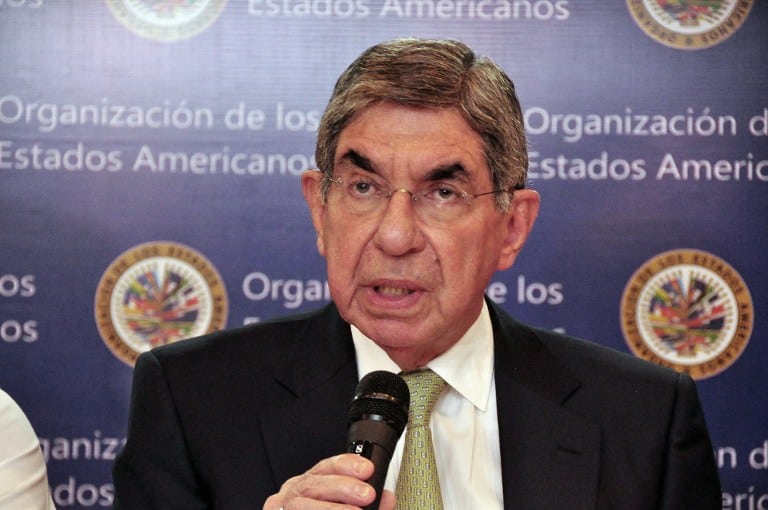Being in harmony with nature and pulling gold from the earth using cyanide and open-pit mining are not incompatible, President Oscar Arias declared this week as he lifted a six-year ban on open-pit metal mining in Costa Rica.
Arias had hinted early on in his presidency that he would be willing to allow mining if it met the country’s environmental regulations. “We cannot be more papist than the Pope,” Arias said at the time (TT, Sept. 8, 2006).
The Environment and Energy Ministry (MINAE) said in a statement released shortly after the ban was lifted April 23 that “a meticulous procedure …of environmental and mining safeguards and verifications” would “guarantee sustainable development and environmental protection.”
These include “strict protection of surface and subterranean water resources,” cooperation with local governments in “elaborating and executing socio-economic, cultural and environmental development plans” and requiring the mining companies to plant trees.
While not entirely unexpected, Arias’ decision to lift the moratorium set off a wave of criticism questioning the president’s commitment to the environment.
“We tell the world that we are a country that defends our ecology,” said former President Abel Pacheco. “How can we be capable such a contradiction?”
Pacheco, who served from 2002 to 2006, originally implemented the moratorium –which also prohibited oil exploration among other measures – just one month into office.
The former president told The Tico Times this week he continues to oppose the industry.
“Open-pit mining should not exist in any country in the world,” he said. “It is an attack on nature. It not only uses very toxic chemicals like cyanide that, at various times, have escaped from their containers contaminating their surroundings and putting an
end to life in a very large area, but also brings heavy metals up to the surface which take nature millennia to bury them again.” The Citizen Action Party (PAC), the largest opposition party in the Legislative Assembly, condemned the decision.
“The road to sustainable development for Costa Rica certainly is not tied to the exploitation of open-pit mines that in the past and the present have demonstrated their negative effects,” said PAC legislator Rafael Elías Madrigal in a statement released shortly after Arias’ announcement.
Arias insists that mining should be allowed as long as it can pass the environmental rigors of MINAE’s Technical Secretariat (SETENA), the office charged with approving environmental impact studies for projects.
Critics, though, point to the Bellavista Mine, located in Pacific slope highlands overlooking the Gulf of Nicoya. In an openpit mine, gold was extracted and removed from rock using cyanide in a method called heap-leach processing. It was one of two projects that were exempted from the 2002 moratorium because they had already received permits when the decree was signed.
In October, heavy rains triggered landslides at the Bellavista mine that crushed a million-dollar processing plant, shut the site down permanently and sparked serious concerns over potential chemical leakage into the surrounding environment.
Bellavista, owned by the Canadian mining firm Central Sun Mining, Inc. (formerly Glencairn Gold Co.), had passed regulatory rigors and received its environmental approval from SETENA, despite warnings from environmentalists that just such a disaster might happen (TT, Jan 18).
Sonia Torres, an opponent of the mine, said the government’s handling of the Bellavista mine makes it clear why the moratorium should not have been lifted. “It has been a total disaster,” she said.
José Francisco Castro, director of MINAE’s Department of Geology and Mines, insisted the risks in mining are no different than those in other industries.
“You see it in any productive activity. Agriculture is the same. Now, people complain about the pineapple farms, they complain about bananas, they complain about tourism. It’s not a problem just of this activity,” he said. “If the state has made the decision to lift the moratorium, it is because the conditions exist to give it oversight.”
Castro’s office is charged with providing that oversight. “This is an institution that is pro-mining and in favor of the lifting of the moratorium,” he said.
Bellavista Owner Under Investigation
With only $250,000 from the firm as a bond against environmental damage, MINAE has prohibited Central Sun Mining from removing any equipment or materials from the site without express authorization.
Local activists, however, have photographed trucks apparently moving equipment off the mine in recent days.
José Francisco Castro, director of MINAE’s Department of Geology and Mines, confirmed the equipment was stopped last weekend near the Nicaraguan border, and Central Sun Mining is under investigation.
“We had prohibited the company from taking apart what used to be the mills… however the company began taking them apart,” he said. “And it is affirmative, the company was trying to take out its equipment.”
Peter Tagliamonte, CEO for Central Sun, said the company is fully cooperating with the government.
“We put together a very comprehensive reclamation plan and presented it to the government,” Tagliamonte said by phone from Canada. “It involves reclaiming the mine site and it involves removing the equipment.”
Tagliamonte said he was unaware of any declaration prohibiting him from removing equipment from the site, saying that his agreement with the government stipulated only that the proceeds from the sale of any of the equipment would be put into a special account for reparations to the site, which he expected to be finished late next year.






